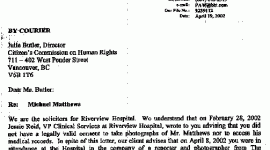Helping the Depressed Person
 As a partner, parent, child or friend of someone who is undergoing a depressive episode, here's how you can help the healing process.
As a partner, parent, child or friend of someone who is undergoing a depressive episode, here's how you can help the healing process.
Clinical depression is an affliction of the mind, body and spirit that affects over 17 million Americans. If you are the partner, parent, child or friend of someone who is undergoing a depressive episode, the pain of seeing a loved one in the depths of clinical depression can be almost as torturous as being depressed oneself. Your understanding of the illness and how you relate to the patient can either support or deter his or her ability to get well. Here are some important ways in which you can help the healing process.
1. If a friend or family member's activity and outlook on life starts to descend and stays down not just a few days, but for weeks, depression may be the cause. The first way you can be of support is to help the person to recognize that there is a problem. This is especially crucial, since many people fail to realize that they are depressed. Begin by encouraging your friend to share his or her feelings with you. Contrary to myth, talking about depression makes things better, not worse. Once it becomes clear that something is amiss, you can suggest that he or she seek professional help. (This is critical since only one third of people with mood disorders ever receive treatment.)
You can be of further support by accompanying your friend to his initial doctor's or therapist's appointment and subsequently monitoring his or her medication. In addition, explain that seeking help for depression does not imply a lack of emotional strength or moral character. On the contrary, it takes both courage and wisdom to know when one is in need of assistance.
2. Educate yourself about the illness, whether it is depression, manic depression, anxiety, etc. Learn about symptoms of depression and how to tell when they are improving. Your feedback to the psychiatrist or therapist about how your friend is faring will help him or her to assess if a particular treatment is working.
3. Provide emotional support. Remember, what a person suffering from depression needs most is compassion and understanding. Exhortations to "snap out of it" or "pull yourself up by your own bootstraps" are counterproductive. The best communication is simply to ask, "How can I be of support?" or "How can I help?"
4. Provide physical support. Often this means participating with your friend in low-stress activities-taking walks, watching movies, going out to eat-that will provide an uplifting focus. In other instances you can ease the depressed person's burden by helping with the daily routines-running errands, doing shopping, taking the kids out for pizza, cooking, vacuuming the carpet, etc.
5. Encourage your friend to make a list of daily self-care activities, and them put them into practice.
6. Monitor possible suicidal gestures or threats. Statements such as "I wish I were dead," "The world would be better off without me," or "I want out" must be taken seriously. The belief that people who talk about suicide are only doing it for the attention is just plain wrong. If the person you care about is suicidal, make sure that his or her primary care doctor is informed. Don't be afraid to talk with the person about his or her suicidal feelings. Meanwhile, hold on to the possibility that your loved one will get better, even if he or she does not believe it.
7. Don't try to talk the depressed person out of his feelings, even if they are irrational. Suppose the depressive says, "My life is a failure," "Life is not worth living," or "All is hopeless." Telling him he is wrong or arguing with him will only add to his demoralized state. Instead, you might want to say, "I'm sorry that you are feeling so bad. What might we do right now to help you feel better?"
8. Maintain a healthy detachment. You may become frustrated when your well-meaning advice and emotional reassurance are met with resistance. Do not take your loved one's pessimism personally-it is a symptom of the illness. When the light you shine is sucked into the black hole of depression, you may become angry or disgusted. Direct your frustration at the illness, not the person. People who suffer from depression complain that their families' resentment over their condition often leads to neglect or outright hostility.
9. If prayer is something you believe in, then pray for your friend's healing. Turn his or her welfare over to the care of a Higher Power. In addition, you may wish to place his or her name on any prayer lists that you can locate (see my book for a listing of prayer ministries). Prayer goes directly to a person's unconscious where it will not meet the negative thinking so commonly found in depression. To respect the person's confidentiality, it is best to pray privately. Moreover, if you put a loved one's name on a prayer list, use first name only.
10. Establish communication with other people in the person's support network-e.g., family members, friends, physicians, therapists, social workers, clergy, etc. By talking to other caregivers, you will obtain additional information and perspective about the depressed person. If possible, arrange for all of the caregivers to meet together in one room for a brainstorming/support session. In this way, you will be working as part of a team-and not in isolation.
Take Care of Yourself
11. Take good care of yourself and your needs. It is easy to get immersed in your friend's care and lose your own sense of self. You may also experience "contagious depression"-i.e., taking on the other person's depressive symptoms-or you may get your own issues triggered. Here are some ideas on how to "inoculate" yourself so that you can stay centered enough to truly help.
-
Take good care of your body. Make sure that you are getting adequate food and rest.
-
Find a safe place to process your feelings. In the role of being a caregiver, you may feel powerless, helpless, worried and scared (when you hear talk of suicide), or resentful and frustrated (at your inability to heal the pain). Or, you may fear being pushed over the precipice into your own depression. Process your frustrations and fears with a trained therapist or a friend; you will be less likely to dump your negative mood (anger, fear or sadness) on the person who is suffering. Remember, it is okay to have negative thoughts as long as you don't act on them.
- Maintain your routine as much as possible. Although you may need to adjust your work schedule or other routines to accommodate helping a depressed person, keep your life as regular as possible. Don't become so involved that you lose touch with friends and social support.
-
Learn to set limits, especially when you are feeling overwhelmed by the depressed person's pain and tales of woe. To avoid burning out or experiencing hostility towards the depressed person, encourage him or her to seek professional help. Your role is that of a friend or family member, not a therapist or a medical doctor.
- Take breaks. When you start to feel emotionally or physically drained, ask other friends and support people to relieve you. Then do things to nurture yourself.
- Continue to pursue activities that bring you pleasure. Having fun will replenish you so that you can keep on giving.
- Give yourself credit for all that you are doing-and realize that you cannot do everything. No matter how much you love another person, you cannot take responsibility for his or her life. Try to distinguish between what you can control (your own responses) and what you cannot (the course of the illness). To this end, you may wish to meditate on AA's "Serenity Prayer."
- Attend support group meetingsfor families who are dealing with mental illness. The local chapters of the following organizations can provide you with times and locations of such groups:
National Alliance for the Mentally Ill,
(800) 950-NAMI
National Depressive and Manic Depressive Association,
(800) 82-NDMDA
Depression and Related Affective Disorders Association,
(410) 955-4647

12. Finally, encourage the person you are caring for to create a support system of other caring people, or help him or her to do so. It takes a whole village to see someone through a dark night of the soul. You cannot transform the illness of depression by yourself, but you can be an integral part of the healing process.
This page was adapted from the book, "Healing from Depression: 12 Weeks to a Better Mood: A Body, Mind, and Spirit Recovery Program", by Douglas Bloch, M.A.
next: Depression - Fighting the Odds and Winning
~ depression library articles
~ all articles on depression
APA Reference
Gluck, S.
(2008, December 6). Helping the Depressed Person, HealthyPlace. Retrieved
on 2025, September 18 from https://www.healthyplace.com/depression/articles/helping-the-depressed-person



